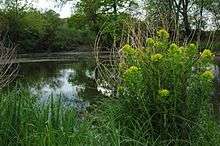Euphorbia palustris
Euphorbia palustris, the marsh spurge or marsh euphorbia, is a species of flowering plant in the family Euphorbiaceae, native to marshland throughout much of mainland Europe and western Asia. It is an herbaceous perennial growing to 90 cm (35 in) tall and wide, with narrow leaves turning red and yellow in autumn, and persistent, bright acid yellow flower-heads (cyathia), 15 cm (6 in) across, in spring.[3]
| Euphorbia palustris | |
|---|---|
 | |
| Scientific classification | |
| Kingdom: | Plantae |
| Clade: | Tracheophytes |
| Clade: | Angiosperms |
| Clade: | Eudicots |
| Clade: | Rosids |
| Order: | Malpighiales |
| Family: | Euphorbiaceae |
| Genus: | Euphorbia |
| Species: | E. palustris |
| Binomial name | |
| Euphorbia palustris | |
| Synonyms | |
| |
It was published and first described by Carl Linnaeus in his book, Species Plantarum on page 462 in 1753.[2][4]
It prefers permanently moist conditions in full sun, hence the common name "marsh spurge" and the Latin specific epithet palustris, "of marshland".[5][6] It is thought to be an ideal plant for gardening because it has a different colour for almost all of the seasons.
Euphorbia palustris has gained the Royal Horticultural Society's Award of Garden Merit.[7][8]
Like all euphorbias, all parts of the plant are toxic if ingested, and cut stems produce an irritant sticky sap.
References
- Kavak, S. (2014). Euphorbia palustris. The IUCN Red List of Threatened Species 2014: e.T19618301A19621151. https://dx.doi.org/10.2305/IUCN.UK.2014-1.RLTS.T19618301A19621151.en. Downloaded on 10 October 2018.
- "Euphorbia palustris L. is an accepted name". 23 March 2012. theplantlist.org. Retrieved 12 October 2017.
- RHS A-Z encyclopedia of garden plants. United Kingdom: Dorling Kindersley. 2008. p. 1136. ISBN 978-1405332965.
- Euphorbiaceae Euphorbia palustris L. 1. ipni.org. Retrieved 12 October 2017.
- Harrison, Lorraine (2012). RHS Latin for gardeners. United Kingdom: Mitchell Beazley. p. 224. ISBN 9781845337315.
- Archibald William Smith A Gardener's Handbook of Plant Names: Their Meanings and Origins, p. 258, at Google Books
- "Euphorbia palustris AGM". Royal Horticultural Society. Retrieved 25 June 2020.
- "AGM Plants - Ornamental" (PDF). Royal Horticultural Society. July 2017. p. 38. Retrieved 25 February 2018.
| Wikimedia Commons has media related to Euphorbia palustris. |
